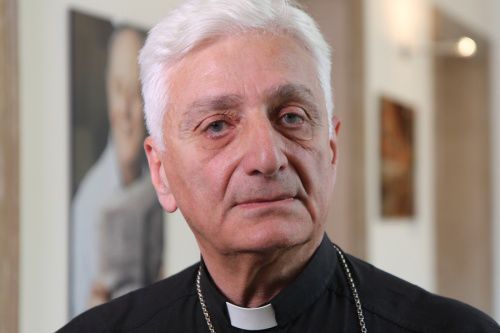Outside entities who drive the Syrian war — either through the selling of arms or their own political and strategic interests — must stop, and the country should look inside itself to resolve the conflict. These are the words of the Chaldean Bishop of Aleppo, Antoine Audo, who has watched the destruction of his country through fighting between its government and various rebel factions over the last four years. “I think the solution is political,” he told CNA. “We have to stop giving arms and money to those groups, and to find a way for a political solution from the Syrian (people), from inside and not from outside.” The Chaldean bishop's words came ahead of a Sept. 16 news conference titled “Syrian Christians: help us to stay,” hosted by Aid to the Church in Need and the Foreign Press Association. During a question and answer session for the event, the bishop said that “at an international level, (there is) a determination to continue the war, to destroy, to divide, until everything has been leveled to the ground, like they did in Iraq, like they did in Libya, like they are doing in Yemen.” The reality of the Syrian war, he said, is one bent on destruction and division that serves both regional and international interests. “I think the first interest is, and Pope Francis has spoken of this on several important occasions, the selling of arms. Economic interests at the regional and international level, and then strategic interests.” Russia has been a leading importer of arms in Syria, donating millions in weapons, including missile systems, which critics have said help keep Syrian president Bashar al-Assad in power, according to Rueters. The United States has also been a generous contributor to the conflict, mostly via a secret CIA operation aimed at training and arming Syrian rebels, the Washington Post reports. Saudi Arabia and Qatar are among the main supporters of the rebels in the Middle East. Since the war first broke out in 2011, 250,000 Syrians have lost their lives, among whom are 11,000 children. Four million Syrians have fled abroad and are living as refugees, while an additional 8 million are internally displaced. Close to 3 million children have stopped going to school, and life expectancy in the country has dropped from 79 in 2011 to 55 today. Bishop Audo told CNA the situation on the ground is one “of war, of danger everywhere, not only for Christians but for everybody,” particularly in Aleppo, which sits near the Turkish border and is more vulnerable to attacks. “It's a very hard situation of danger and poverty. For instance, we’re still living for more than a month or two with no water or electricity,” he said. In his speech, the bishop said that poverty is drastically increasing, and that “when I walk out onto the street I see an aggressive poverty. Misery.” He noted how there is one well in Aleppo where people go to get water, of which there is a shortage. Children can frequently be seen in the streets with empty bottles in hand looking for water, he said, adding that the hot summer has aggravated the situation. “All of those who can leave do, because this region is in immense poverty…how can one live without dignity and quality of life?” he asked. This is the situation that leads many to gather what funds they can and travel to Turkey to pay for a trip across the sea, which all too often end in “these terrible accidents and deaths…because there isn’t a horizon for a solution.” As the authority who oversees Aleppo's Chaldean Catholic population, Bishop Audo said that he understands why they are leaving, but wants to do everything possible to help them stay. “It's not easy,” he confessed, adding that to see Christians leaving is “an experience of death, an experience of the end of our presence.” “Not for me as a Chaldean bishop, but for all patriarchs, all bishops, for the whole community,” he said, but conceded that “we don’t have another choice in front of us. This is the drama we are living today.” However, he told CNA that the presence of Christians “is very important for Syria, for the universal Church, for Arabic Christianity in dialogue with Islam, and for our Eastern Churches rooted in this country,” and because of this he will continue to do what’s possible for Christians to stay.

